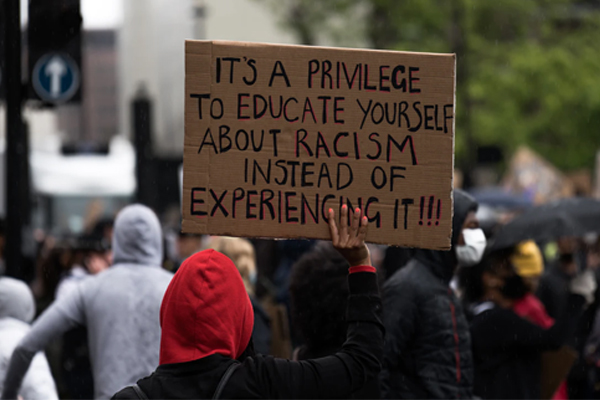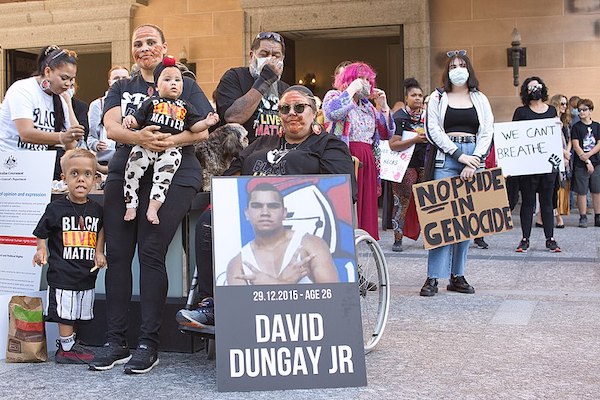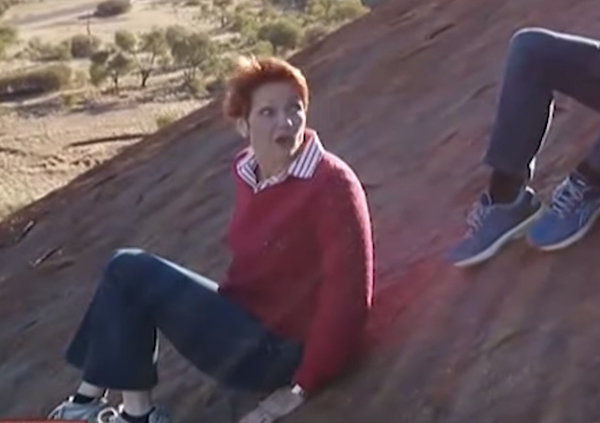It's hard enough dealing with racist attitudes within our country, but when they come from within one's own family the impact is more painful, writes Celeste Liddle.
Content warning: contains descriptions of racism and a racist slur.
“He only got that free kick because he’s an Abo.”
This comment still rings in my ears like it was said yesterday, yet seven years must have passed since I heard it. The comment is still important to me because it marks an end of a relationship — it was a day where I came to the conclusion that things were never going to change and I walked out a door. In a room where I was the only Aboriginal person surrounded by people who heard the comment yet said nothing to the person who said it, nor did they acknowledge me so I felt supported, I finally realised that there was no place for me there. It was heartbreaking.
This may sound like a reasonably normal day in the life of an Aboriginal person in Australia, yet there’s a key fact I’m yet to divulge: I wasn’t at the pub where I was surrounded by acquaintances and unknowns. This happened at a family gathering and while I was not related to the person who made the comment, I was related to a number of people who did nothing.
For years, I have been fed rubbish about how those of us who are Aboriginal people of mixed descent apparently have an easy go of things. Our proximity to whiteness is often what people say we need to be accepted and get ahead in this world. As long as we live in a good White suburb, have good White family members, get a decent White education and follow that up with a nice mainstream job, we’ll just blend in.
As former Collingwood President Alan McAllister said:
“As long as they conduct themselves like human beings...”
Well, I had that White suburban schooling. I had non-Indigenous extended family members. I had the White Australian suburban experience. The suburb I grew up in couldn’t have been more monocultural if it tried. Yet I cannot, for the life of me, remember a time when I was thought of as being “just like them”. I was always the Aboriginal kid in that environment. And yes, I experienced a lot of racism due to this, but this piece isn’t about that. It’s about what happens when you experience racism in your own family.
The scenario I describe wasn’t isolated. It had followed years of microaggressions. Perhaps social media played a part. It gave the opportunity for secret long-held attitudes to be brought to the surface. Whilst non-Indigenous family members were having to deal with the fact that I wasn’t just their relation – I was also proudly Aboriginal – so, too, did their pushback amplify.
First, there was the unfriending that happened when I wrote something “too hardcore” about Invasion Day. Then there was the blowback my siblings received — the constant whisperings behind our backs that we didn’t celebrate our “White side” when we had grown up surrounded by it.
The attacks intensified. There were targeted photos of them celebrating Australia Day while I was out on the streets marching. There was the unsubtle reminder by an in-law that we “speak English in Australia”, stated as he stared straight at me. Finally, there was the realisation that though these people were related to me, some had chosen to support fascist politicians and had embraced far-right movements. For one of them, the final straw was when I chose to sign an open letter to the Collingwood Football Club calling on them to take action in the wake of the Do Better report and for Eddie McGuire to step down.
It was following the Eddie McGuire stuff that I put the call out to other Aboriginal people to find out if they had had similar experiences with their non-Indigenous relations. I wasn’t expecting to get as many stories as I did but I soon learnt that my experiences were far from unique. From White grandparents who gave presents to their non-Indigenous descendants but not their Indigenous descendants, to White relations suddenly caring about the Black Lives Matter movement in the U.S. while ignoring the Indigenous rights movements here.
From siblings ignoring the other’s identity, to non-Indigenous parents denying their kid’s experiences of racism because they are a “mix”. Racist uncles having a dig when seeing their nieces and nephews engaged in culture, of course, made an appearance. Some people even told me of acts of violence they had experienced within extended families which had been racialised.
It was sobering to read all this, yet it really rammed a point home to me: that I was not alone in my experiences. Due to the impacts of colonisation which have led to everything from loving intermarriage to acts of sexual violence, most Aboriginal people have non-Indigenous relations. Most of these people have, at some time or another, experienced racism within their extended family. We expect those who we share blood ties with and who we have grown up alongside to know better. This doesn’t always happen.
Indeed, these people can be everything from complacent to downright aggressive when confronted with their racist transgressions. Certainly, in my case, it felt like people became more aggressive the more I stood up for myself. At the end of the day, though, I felt pride and strength in my heritage and culture knowing that even in the face of these attacks, they were unshakeable.
I have argued many times that the declaration of terra nullius on this landmass formed a racist social bedrock that exists to this day. The White Australian mentality reigns supreme. With intra-family racism, a reality for so many Aboriginal people, it makes a lie of the idea of reconciliation — that we need simply to reach our hands across the racial divide and things will get better. Indeed, given my experiences, I know it’s going to take a lot more work and a lot more truth-telling than that.
Celeste Liddle is an Arrernte woman, trade unionist and a freelance opinion writer and social commentator. Follow her on Twitter @Utopiana. This article was first published on Eureka Street on 22 April 2021 and has been republished with permission.
Related Articles
- Anti-racism allies: More needs to be done
- Death by design: Systemic racism and police brutality in the U.S. and Australia
- Racist hate crimes targeting Sydney's Indigenous homeless
- #RacismNotWelcome campaign a visible sign of the times
- Students' racist slurs outrage community
Support independent journalism Subscribe to IA.














